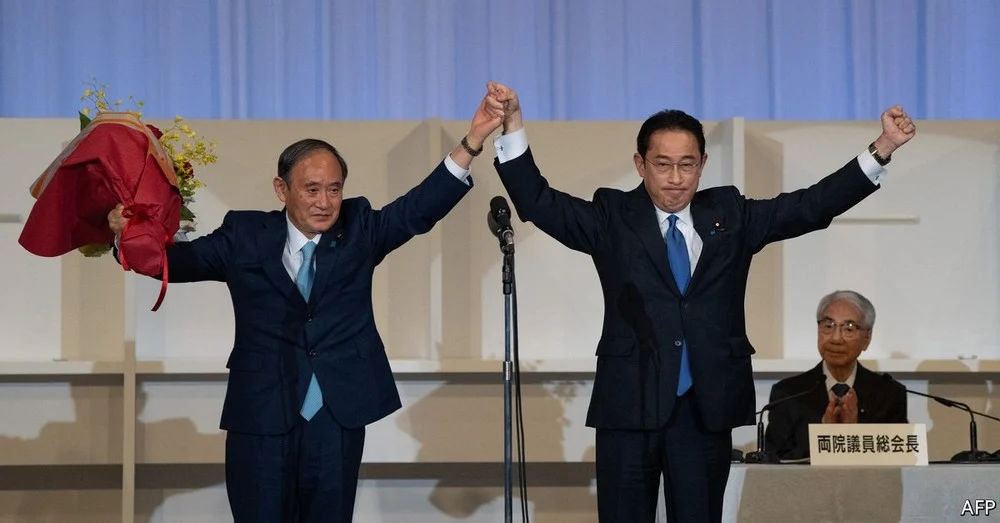TOKYO – KISHIDA FUMIO, a former foreign minister, won the election today to become president of Japan’s ruling Liberal Democratic Party (LDP). Given the party’s dominance in parliament, the victory will also make him Japan’s new prime minister. Mr Kishida (pictured, right) defeated Kono Taro, another former foreign minister, in a second round run-off, after none of the four initial candidates secured a majority in the first round.
The result reflects the enduring strength of the party’s old guard, which is wary of Mr Kono, and its disregard for broader public opinion, given the weakness of Japan’s opposition parties. Mr Kono, a popular figure on social media, was the clear favourite in polls of the general public. Many younger lawmakers backed him, too, pitching the campaign as a generational contest. Mr Kono won 44% of the total rank-and-file vote in the first round to Mr Kishida’s 29%. Yet his support among his colleagues in parliament was weak. That proved to be his downfall in the run-off, where the party’s 382 lawmakers held more sway. There, supporters of Mr Kishida and the third-place finisher, Takaichi Sanae, united to defeat him. As Toshikawa Takao, editor of Insideline, a political newsletter, puts it: “Generational change is not so easy for the LDP.”
Mr Kishida faces a daunting assignment. His predecessor, Suga Yoshihide (pictured, left), who defeated him in a leadership election just one year ago, stepped down this month amid widespread dissatisfaction with his government’s handling of covid-19 and his uninspiring leadership. Mr Kishida will enjoy more favourable timing than Mr Suga. With Japan’s daily caseload shrinking, the government will lift the state of emergency in place in 19 prefectures as of October 1st; after a slow start, Japan has fully vaccinated 64% of its population, nearly matching America’s rate. Nonetheless, he will have to regain public trust and present a credible plan for reopening the country safely and reviving the flagging economy.
Politics is a family business for Mr Kishida (as for many of his peers, including Mr Kono). Both his father and grandfather served in the Diet’s lower house; his political career began as a secretary to his father. He is also related to a former prime minister, Miyazawa Kiichi, on whom President George H.W. Bush once memorably threw up.
In his time as foreign minister Mr Kishida co-ordinated Barack Obama’s visit in 2016 to his hometown, Hiroshima, and helped broker an agreement with South Korea for Japan to compensate “comfort women”, as those forced into brothels by Japanese soldiers during the second world war were known. (The agreement later fell apart after power changed hands in South Korea.) In Japanese political circles, Mr Kishida is known for being an affable colleague, a dull personality and a big drinker. As foreign minister to Abe Shinzo, Mr Suga’s predecessor, he engaged in vodka- and sake-drinking contests with his Russian counterpart, Sergei Lavrov, in a futile attempt to improve ties.
Mr Kishida has sought to portray himself as an empathetic leader. At campaign events, he brandished a blue notebook that he carries to record voters’ voices; in his political memoir, entitled “Kishida Vision: From Division to Collaboration”, he pledged to be the kind of leader that “can elicit co-operation from the public”.
Like his platitudes, Mr Kishida’s vision for the country is fuzzy. During the campaign, he sought to appeal to all corners of the party. Despite describing himself in the past as the dove to Mr Abe’s hawk, he sounded tougher notes on China to appease the right wing, condemning Chinese abuses of Uyghurs in Xinjiang and expressing openness to Japan being able to launch pre-emptive attacks on enemy missile bases. He attacked the party’s octogenarian secretary-general and promised to promote younger lawmakers who have chafed at the elders’ control. He promised more stimulus to counter the fallout from the pandemic, but has also nodded to fiscal hawks. He has spoken of the need for “a new model of Japan’s capitalism” that would focus more on fighting economic inequality, but offered few details. “It’s easy as a slogan, but how to implement it?” asks Iio Jun of the National Graduate Institute for Policy Studies, a university in Tokyo.
Mr Kishida’s lack of a strong vision is part of what got him elected. For the leaders of the party’s factions, he cut a far less threatening and more pliable figure than Mr Kono, who has a reputation as a bit of a maverick. But such qualities are unlikely to make Mr Kishida a memorable leader. Expectations are low. “He is likely a caretaker, and at best a stabiliser,” says Funabashi Yoichi, head of the Asia Pacific Initiative, a think-tank in Tokyo. Many Japanese bureaucrats are pleased. “He will let the Kasumigaseki bureaucracy feel revived,” Mr Toshikawa says, referring to Japan’s government nerve centre.
His first big task will be to lead the party in elections for the Diet’s lower house, which must be held by the end of November. By ignoring public opinion in choosing Mr Kishida, the LDP may face a tough race. It is also likely to deepen the apathy and disillusion with politics that many voters already feel. Yet the enduring weakness of the country’s opposition parties means there is virtually no chance of the LDP’s losing power. Mr Kishida’s new job, however, is less secure.
By The Economist





